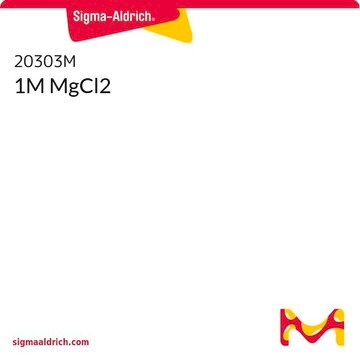63069
Magnesium chloride solution
BioUltra, for molecular biology, ~1 M in H2O
Synonym(s):
Magnesium Chloride hydrate, Magnesium chloride (MgCl2)hexahydrate, MgCl2
About This Item
Recommended Products
grade
for molecular biology
Quality Level
product line
BioUltra
form
liquid
concentration
~1 M in H2O
technique(s)
HPLC: suitable
flow cytometry: suitable
impurities
DNases, none detected
RNases, none detected
insoluble matter, passes filter test
phosphatases, none detected
proteases, none detected
≤0.0002% total Nitrogen (N)
pH
5.0-7.5 (25 °C, 1 M in H2O)
solubility
water: soluble
density
1.08 g/mL at 20 °C
anion traces
phosphate (PO43-): ≤10 mg/kg
sulfate (SO42-): ≤50 mg/kg
cation traces
Al: ≤1 mg/kg
As: ≤0.1 mg/kg
Ba: ≤1 mg/kg
Bi: ≤1 mg/kg
Ca: ≤10 mg/kg
Cd: ≤1 mg/kg
Co: ≤1 mg/kg
Cr: ≤1 mg/kg
Cu: ≤1 mg/kg
Fe: ≤1 mg/kg
K: ≤50 mg/kg
Li: ≤1 mg/kg
Mn: ≤1 mg/kg
Mo: ≤1 mg/kg
Na: ≤500 mg/kg
Ni: ≤1 mg/kg
Pb: ≤1 mg/kg
Sr: ≤1 mg/kg
Zn: ≤1 mg/kg
λ
1 M in H2O
UV absorption
λ: 260 nm Amax: 0.05
λ: 280 nm Amax: 0.03
suitability
suitable for molecular biology
SMILES string
Cl[Mg]Cl
application(s)
cell analysis
filtration
vaccine development
InChI
1S/2ClH.Mg/h2*1H;/q;;+2/p-2
InChI key
TWRXJAOTZQYOKJ-UHFFFAOYSA-L
Looking for similar products? Visit Product Comparison Guide
Related Categories
General description
Application
Other Notes
comparable product
Storage Class Code
12 - Non Combustible Liquids
WGK
WGK 1
Flash Point(F)
Not applicable
Flash Point(C)
Not applicable
Personal Protective Equipment
Choose from one of the most recent versions:
Already Own This Product?
Find documentation for the products that you have recently purchased in the Document Library.
Customers Also Viewed
Our team of scientists has experience in all areas of research including Life Science, Material Science, Chemical Synthesis, Chromatography, Analytical and many others.
Contact Technical Service





